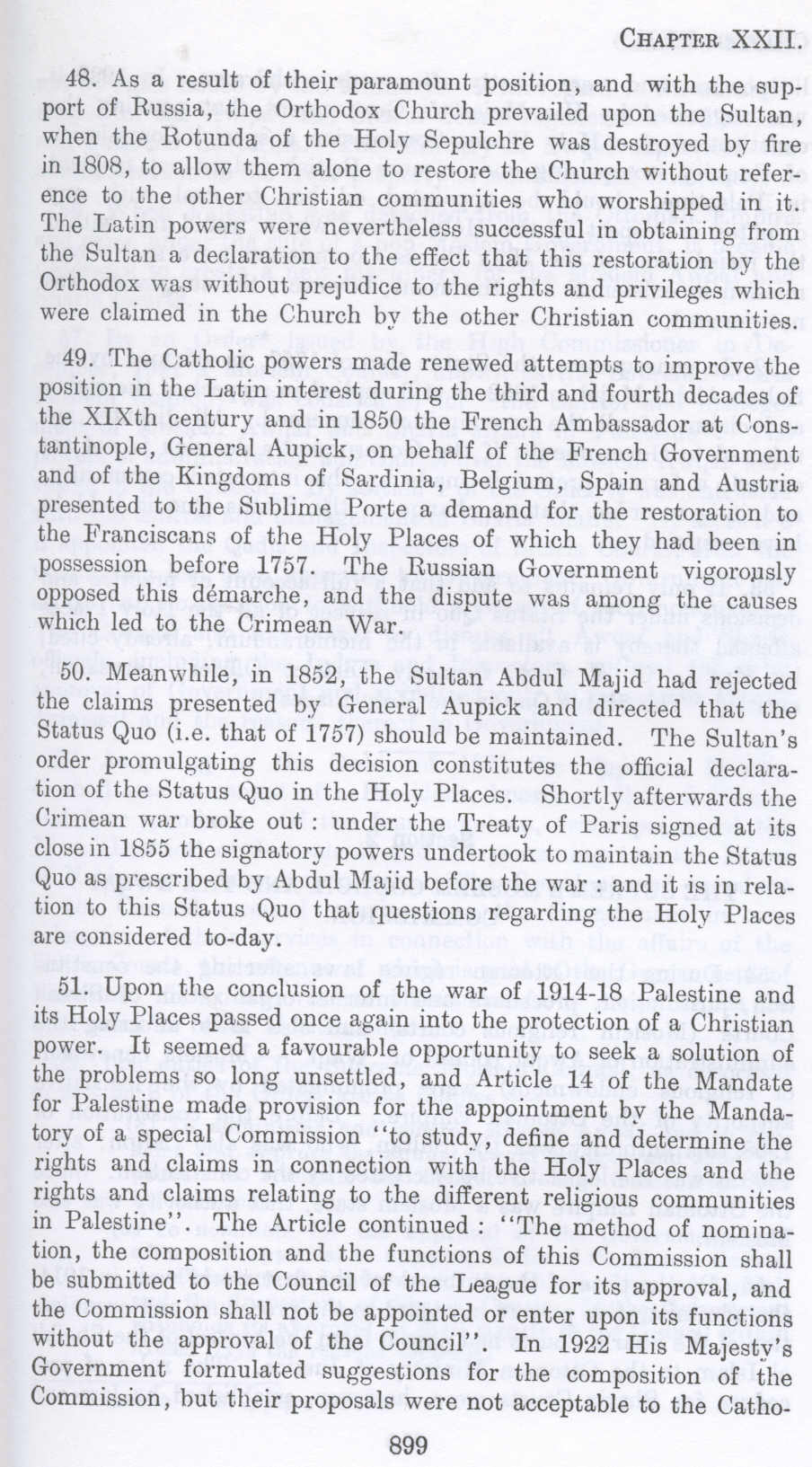| Prev | Next |  |
| Prev | Next |
| PalestineRemembered | About Us | Oral History | العربية | |
| Pictures | Zionist FAQs | Haavara | Maps | |
| Search |
| Camps |
| Districts |
| Acre |
| Baysan |
| Beersheba |
| Bethlehem |
| Gaza |
| Haifa |
| Hebron |
| Jaffa |
| Jericho |
| Jerusalem |
| Jinin |
| Nablus |
| Nazareth |
| Ramallah |
| al-Ramla |
| Safad |
| Tiberias |
| Tulkarm |
| Donate |
| Contact |
| Profile |
| Videos |
British Mandate: A Survey of Palestine: Volume II - Page 899 |
Disclaimer
The above documents, article, interviews, movies, podcasts, or stories reflects solely the research and opinions of its authors. PalestineRemembered.com makes its best effort to validate its contents.


Post Your Comment
*It should be NOTED that your email address won't be shared, and all communications between members will be routed via the website's mail server.
48. As a result of their paramount position, and with the support of Russia, the Orthodox Church prevailed upon the Sultan, when the Rotunda of the Holy Sepulchre was destroyed by fire in 1808, to allow them alone to restore the Church without reference to the other Christian communities who worshipped in it. The Latin powers were nevertheless successful in obtaining from the Sultan a declaration to the effect that this restoration by the Orthodox was without prejudice to the rights and privileges which were claimed in the Church by the other Christian communities.
49. The Catholic powers made renewed attempts to improve the position in the Latin interest during the third and fourth decades of the XIXth century and in 1850 the French Ambassador at Constantinople, General Aupick, on behalf of the French Government and of the Kingdoms of Sardinia, Belgium, Spain and Austria presented to the Sublime Porte a demand for the restoration to the Franciscans of the Holy Places of which they had been in possession before 1757. The Russian Government vigorously opposed this demarche, and the dispute was among the causes which led to the Crimean War.
50. Meanwhile, in 1852, the Sultan Abdul Majid had rejected the claims presented by General Aupick and directed that the Status Quo (i.e. that of 1757) should be maintained. The Sultan's order promulgating this decision constitutes the official declaration of the Status Quo in the Holy Places. Shortly afterwards the Crimean war broke out : under the Treaty of Paris signed at its close in 1855 the signatory powers undertook to maintain the Status Quo as prescribed by Abdul Majid before the war : and it is in relation to this Status Quo that questions regarding the Holy Places are considered to-day.
51. Upon the conclusion of the war of 1914-18 Palestine and its Holy Places passed once again into the protection of a Christian power. It seemed a favourable opportunity to seek a solution of the problems so long unsettled, and Article 14 of the Mandate for Palestine made provision for the appointment by the Mandatory of a special Commission "to study, define and determine the rights and claims in connection with the Holy Places and the rights and claims relating to the different religious communities in Palestine''. The Article continued : "The method of nomination, the composition and the functions of this Commission shall be submitted to the Council of the League for its approval, and the Commission shall not be appointed or enter upon its functions without the approval of the Council''. In 1922 His Majesty's Government formulated suggestions for the composition of the Commission, hut their proposals were not acceptable to the Catho-
899